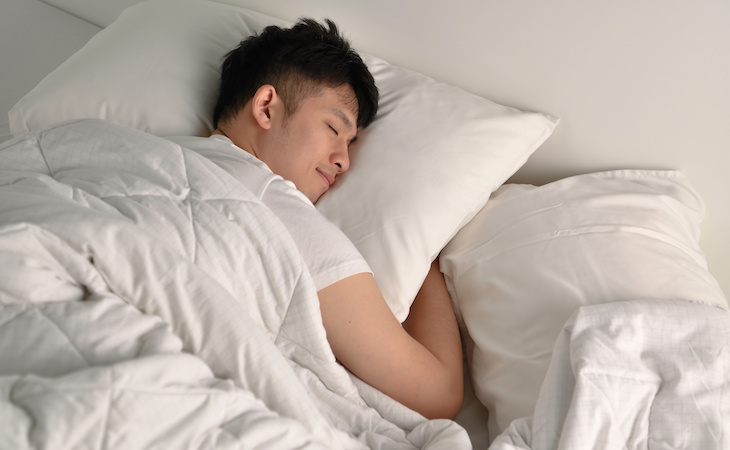A new study of more than 90,000 people finds that “catching up” on sleep over the weekend can actually lower the risk of heart disease by nearly 20% in people who regularly experience inadequate sleep.
Using self-reported data over a median follow-up period of 14 years, UK Biobank project researchers at the State Key Laboratory of Infectious Disease in China reaffirmed the harmful impact of regular sleep deprivation—defined as less than seven hours—but confirmed that sleeping in and making up even some lost sleep on weekends can have a significant positive effect on heart health.
Below, we look at the study findings and offer a few tips for how to sleep in on weekends.
The health benefits of sleeping in on weekends
Sleep deprivation can contribute to a variety of health problems that lead to cardiovascular issues. The researchers of this new study were interested in finding differences in cardiovascular events including ischemic heart disease, atrial fibrillation, heart failure, and stroke.
The study found that, for both women and men, getting extra sleep on weekends for those who don’t get adequate sleep during the week was associated with a lower chance of having heart disease compared with individuals who don’t make up for their lost sleep time on weekends.
Those with sleep deprivation who had the most weekend compensatory sleep had approximately 20% lower likelihood of cardiovascular events than those who slept less over the weekend.
“Sufficient compensatory sleep is linked to a lower risk of heart disease,” said Yanjun Song, of the State Key Laboratory of Infectious Disease, Fuwai Hospital, National Centre for Cardiovascular Disease in Beijing, China, in a press release. “The association becomes even more pronounced among individuals who regularly experience inadequate sleep on weekdays.”
Zechen Liu, another of the researchers, said this in the press release: “Our results show that for the significant proportion of the population in modern society that suffers from sleep deprivation, those who have the most ‘catch-up’ sleep at weekends have significantly lower rates of heart disease than those with the least.”
How to sleep later on weekends
Now that you have this information, what can you do to catch up on sleep on the weekends?
Raj Dasgupta, MD, chief medical advisor for Sleepopolis, suggests the best way to get extra sleep on weekends is to follow the same steps for getting a good night’s sleep during the week:
- Keep your bedroom cool, dark, and quiet.
- Avoid caffeine and alcohol at least eight hours before bed.
- Slowly adjust your bedtime by going to sleep a little later each night.
- Try relaxing activities, such as reading or taking a warm bath to help you wind down.
- Limit daytime naps so you’re more ready for a full night’s sleep.
FAQs
Is it bad to sleep late on weekends?
No, it’s not bad. But sleep experts caution that while making up on weekends for inadequate rest during the week can be helpful for your heart and health, it’s not a good permanent solution.
“Yes, sleeping more on weekends can help you recover from lost sleep during the week and might lower your heart disease risk by about 20%,” Dasgupta says. “However, I’d remind people that this is not a good long-term plan.”
While extra weekend sleep can help you feel better, Dasgupta reminds us that regularly getting less than seven hours of sleep a night can still lead to health problems over time. “It’s better to try to get enough sleep every night,” he says.
Can sleeping in on weekends help you catch up on sleep?
It’s important to understand that sleep is an essential body function that all parts of our bodies require to keep them operating at their best. Not getting enough sleep on a regular basis is a recipe for poor health—and in fact, it negatively affects both physical and mental health.
“Sleep is crucial for repairing tissues, supporting the immune system, and balancing hormones,” says Dasgupta. “The study shows that catching up on sleep, even just on weekends, helps the body recover by lowering stress hormones, reducing blood pressure, and normalizing heart rate.”
However, Dagsupta cautions: “This doesn’t mean you can replace regular, good sleep with weekend catch-up sleep.”
Have trouble snoozing? Here are 15 things to do if you can’t sleep.




